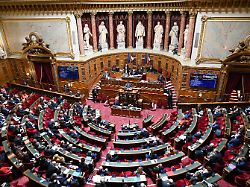Free trade agreement on the verge of collapse?
France could overturn CETA agreement
March 21, 2024, 8:56 p.m
Listen to article
This audio version was artificially generated. More info | Send feedback
A right-left alliance in the French Senate rejects ratification of the EU free trade agreement with Canada. The background is the ongoing farmers’ protests. The agreement, which is already being applied provisionally, is therefore at stake.
The French Senate surprisingly voted against ratification of the EU free trade agreement with Canada (CETA) with a large majority. An unusual alliance of right-wing and left-wing members of the upper house voted against the agreement, which has been provisionally in force since 2017. This means that the bill goes back to the National Assembly for ratification. This voted in favor of it with a narrow majority in 2019.
CETA was signed in 2016 and provisionally introduced at European level in 2017. In order for it to apply fully, all national and, depending on the member state, regional parliaments must ratify the agreement. So far, this has only happened in 17 of the 27 EU countries – some governments have not yet submitted the text to their parliaments, probably out of fear of a negative vote.
This is also the case in France: after it was passed by the National Assembly, the text was not submitted to the Senate for a long time. The fact that this happened after all goes back to the senators of the Communist Party. They put the vote on ratification on the agenda.
Macron could be in dire straits
The agreement contains more than 2,300 pages and is intended to facilitate trade between the European Union and Canada, reduce barriers and establish rules for international trade. Almost all customs duties are to be eliminated and the options for companies to take legal action against individual states are to be made easier with the help of an arbitration tribunal. This section in particular has always received criticism. But environmentalists and trade unionists also fear that environmental or occupational safety regulations will be undermined.
In France, farmers in particular are criticizing this plan because they fear unfair competition. The maneuver by the communists together with social democrats, right-wing populists and right-wing extremists is also due to the ongoing protests by farmers. French President Emmanuel Macron has stated several times in the past that he rejects the agreement.
The communist members of the National Assembly immediately put the draft bill on the agenda for ratification on May 30, ten days before the European Parliament elections. If this vote were also against the free trade agreement, Macron would be in serious political trouble. He would then have to officially register his country’s rejection in Brussels, which would end the provisional application of the agreement. If he does not do this, he would make himself vulnerable for ignoring a parliamentary decision.
In Germany, activists failed in their appeal against CETA before the Federal Constitutional Court. The Bundestag and Bundesrat then approved the ratification of the agreement in December 2022, and the ratification law came into force on January 20, 2023.
